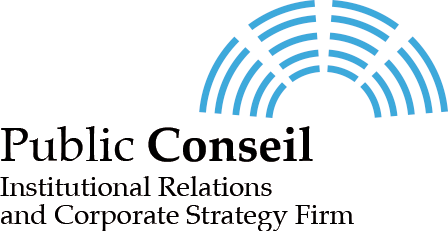Institutional relationships
Deontology: the common thread in lobbying
Independence, discretion and respect for the institutions are the fundamental values on which Public Conseil is built.
Participation in public decision-making and the strengthening of dialogue and consultation are the aims pursued in order to involve the economic world in fairer and more coherent political decisions.
Lobbying must also be in the general interest, because a healthy economic sector means more jobs and more national and international influence.
Mission : Companies and Institutions, relationships to be created
Getting involved with a company means understanding its business, its challenges and its regulatory environment.
It means informing it in real time of the evolutionary projects in its sector of activity.
It means translating into simple terms issues that are often very technical and complicated, in order to extract the essential knot to untie.
It means guiding and accompanying them in their dealings with policy makers.
Each environment has its own codes, its own way of working, its own modes of expression, its own priorities.
The business world is not the political world and vice versa. The two always benefit from each other.
Public Conseil’s strength lies in having a team from both these sectors.
Working with ministerial cabinets, members of parliament in the National Assembly or Senate, and members of local authorities, Public Conseil has been cultivating an extensive and effective network of relationships with companies and professional federations for over 20 years.
Viewpoint: institutions within reach of businesses
The facts prove those who integrate the institutional mission into their anticipation and development strategy right.
The reason is simple: elected representatives, who cannot be specialists in everything, need to know the realities on the ground. Entrepreneurs, for their part, have a real knowledge of the legislative and regulatory developments affecting their sector of activity.
Both parties thus have a common interest in acting in this concerted way.
Finally, let us never forget the first rule of democracy, that it is the elected representatives who decide and vote.
The role of a lobbyist is to enlighten, and only to enlighten, it is important to remind those who like to pretend that they have more power.
This would be an insult to the quality of our elected representatives and to the French people who elected them.



